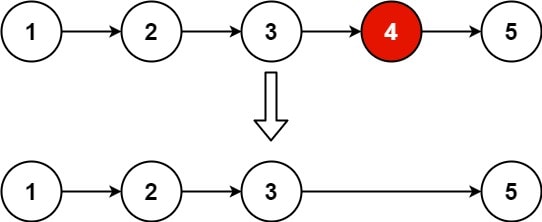This content originally appeared on DEV Community and was authored by seanpgallivan
This is part of a series of Leetcode solution explanations (index). If you liked this solution or found it useful, please like this post and/or upvote my solution post on Leetcode's forums.
Leetcode Problem #19 (Medium): Remove Nth Node From End of List
Description:
(Jump to: Solution Idea || Code: JavaScript | Python | Java | C++)
Given the
headof a linked list, remove thenth node from the end of the list and return itshead.Follow up: Could you do this in one pass?
Examples:
Example 1: Input: head = [1,2,3,4,5], n = 2 Output: [1,2,3,5] Visual:
Example 2: Input: head = [1], n = 1 Output: []
Example 3: Input: head = [1,2], n = 1 Output: [1]
Constraints:
- The number of nodes in the list is
sz.1 <= sz <= 300 <= Node.val <= 1001 <= n <= sz
Idea:
(Jump to: Problem Description || Code: JavaScript | Python | Java | C++)
With a singly linked list, the only way to find the end of the list, and thus the n'th node from the end, is to actually iterate all the way to the end. The challenge here is attemping to find the solution in only one pass. A naive approach here might be to store pointers to each node in an array, allowing us to calculate the n'th from the end once we reach the end, but that would take O(M) extra space, where M is the length of the linked list.
A slightly less naive approach would be to only store only the last n+1 node pointers in the array. This could be achieved by overwriting the elements of the storage array in circlular fashion as we iterate through the list. This would lower the space complexity to O(N+1).
In order to solve this problem in only one pass and O(1) extra space, however, we would need to find a way to both reach the end of the list with one pointer and also reach the n'th node from the end simultaneously with a second pointer.
To do that, we can simply stagger our two pointers by n nodes by giving the first pointer (fast) a head start before starting the second pointer (slow). Doing this will cause slow to reach the n'th node from the end at the same time that fast reaches the end.
Since we will need access to the node before the target node in order to remove the target node, we can use fast.next == null as our exit condition, rather than fast == null, so that we stop one node earlier.
This will unfortunately cause a problem when n is the same as the length of the list, which would make the first node the target node, and thus make it impossible to find the node before the target node. If that's the case, however, we can just return head.next without needing to stitch together the two sides of the target node.
Otherwise, once we succesfully find the node before the target, we can then stitch it together with the node after the target, and then return head.
Implementation:
There are only minor differences between the code of all four languages.
Javascript Code:
(Jump to: Problem Description || Solution Idea)
var removeNthFromEnd = function(head, n) {
let fast = head, slow = head
for (let i = 0; i < n; i++) fast = fast.next
if (!fast) return head.next
while (fast.next) fast = fast.next, slow = slow.next
slow.next = slow.next.next
return head
};
Python Code:
(Jump to: Problem Description || Solution Idea)
class Solution:
def removeNthFromEnd(self, head: ListNode, n: int) -> ListNode:
fast, slow = head, head
for _ in range(n): fast = fast.next
if not fast: return head.next
while fast.next: fast, slow = fast.next, slow.next
slow.next = slow.next.next
return head
Java Code:
(Jump to: Problem Description || Solution Idea)
class Solution {
public ListNode removeNthFromEnd(ListNode head, int n) {
ListNode fast = head, slow = head;
for (int i = 0; i < n; i++) fast = fast.next;
if (fast == null) return head.next;
while (fast.next != null) {
fast = fast.next;
slow = slow.next;
}
slow.next = slow.next.next;
return head;
}
}
C++ Code:
(Jump to: Problem Description || Solution Idea)
class Solution {
public:
ListNode* removeNthFromEnd(ListNode* head, int n) {
ListNode *fast = head, *slow = head;
for (int i = 0; i < n; i++) fast = fast->next;
if (!fast) return head->next;
while (fast->next) fast = fast->next, slow = slow->next;
slow->next = slow->next->next;
return head;
}
};
This content originally appeared on DEV Community and was authored by seanpgallivan
seanpgallivan | Sciencx (2021-04-18T08:12:33+00:00) Solution: Remove Nth Node From End of List. Retrieved from https://www.scien.cx/2021/04/18/solution-remove-nth-node-from-end-of-list/
Please log in to upload a file.
There are no updates yet.
Click the Upload button above to add an update.


